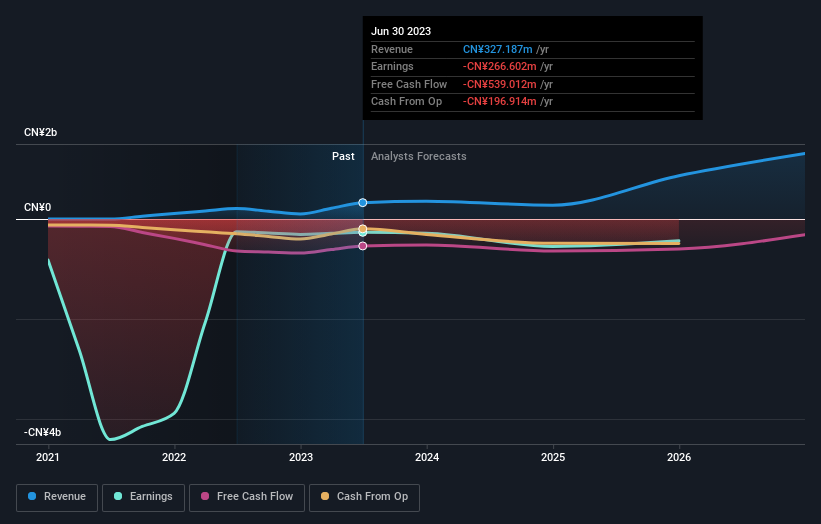Stock Analysis
Individual investors are Keymed Biosciences Inc.'s (HKG:2162) biggest owners and were hit after market cap dropped HK$1.9b

Key Insights
- Significant control over Keymed Biosciences by individual investors implies that the general public has more power to influence management and governance-related decisions
- 50% of the business is held by the top 8 shareholders
- Institutions own 27% of Keymed Biosciences
A look at the shareholders of Keymed Biosciences Inc. (HKG:2162) can tell us which group is most powerful. With 39% stake, individual investors possess the maximum shares in the company. Put another way, the group faces the maximum upside potential (or downside risk).
And last week, individual investors endured the biggest losses as the stock fell by 17%.
Let's delve deeper into each type of owner of Keymed Biosciences, beginning with the chart below.
See our latest analysis for Keymed Biosciences

What Does The Institutional Ownership Tell Us About Keymed Biosciences?
Many institutions measure their performance against an index that approximates the local market. So they usually pay more attention to companies that are included in major indices.
As you can see, institutional investors have a fair amount of stake in Keymed Biosciences. This implies the analysts working for those institutions have looked at the stock and they like it. But just like anyone else, they could be wrong. When multiple institutions own a stock, there's always a risk that they are in a 'crowded trade'. When such a trade goes wrong, multiple parties may compete to sell stock fast. This risk is higher in a company without a history of growth. You can see Keymed Biosciences' historic earnings and revenue below, but keep in mind there's always more to the story.

Keymed Biosciences is not owned by hedge funds. The company's largest shareholder is Moonshot Holdings Limited, with ownership of 28%. In comparison, the second and third largest shareholders hold about 5.9% and 5.0% of the stock.
On further inspection, we found that more than half the company's shares are owned by the top 8 shareholders, suggesting that the interests of the larger shareholders are balanced out to an extent by the smaller ones.
While it makes sense to study institutional ownership data for a company, it also makes sense to study analyst sentiments to know which way the wind is blowing. There are plenty of analysts covering the stock, so it might be worth seeing what they are forecasting, too.
Insider Ownership Of Keymed Biosciences
While the precise definition of an insider can be subjective, almost everyone considers board members to be insiders. The company management answer to the board and the latter should represent the interests of shareholders. Notably, sometimes top-level managers are on the board themselves.
Insider ownership is positive when it signals leadership are thinking like the true owners of the company. However, high insider ownership can also give immense power to a small group within the company. This can be negative in some circumstances.
We note our data does not show any board members holding shares, personally. It is unusual not to have at least some personal holdings by board members, so our data might be flawed. A good next step would be to take a look at this free summary of insider buying and selling.
General Public Ownership
With a 39% ownership, the general public, mostly comprising of individual investors, have some degree of sway over Keymed Biosciences. While this size of ownership may not be enough to sway a policy decision in their favour, they can still make a collective impact on company policies.
Private Company Ownership
It seems that Private Companies own 28%, of the Keymed Biosciences stock. It might be worth looking deeper into this. If related parties, such as insiders, have an interest in one of these private companies, that should be disclosed in the annual report. Private companies may also have a strategic interest in the company.
Next Steps:
It's always worth thinking about the different groups who own shares in a company. But to understand Keymed Biosciences better, we need to consider many other factors. Be aware that Keymed Biosciences is showing 3 warning signs in our investment analysis , and 1 of those makes us a bit uncomfortable...
If you would prefer discover what analysts are predicting in terms of future growth, do not miss this free report on analyst forecasts.
NB: Figures in this article are calculated using data from the last twelve months, which refer to the 12-month period ending on the last date of the month the financial statement is dated. This may not be consistent with full year annual report figures.
Valuation is complex, but we're helping make it simple.
Find out whether Keymed Biosciences is potentially over or undervalued by checking out our comprehensive analysis, which includes fair value estimates, risks and warnings, dividends, insider transactions and financial health.
View the Free AnalysisHave feedback on this article? Concerned about the content? Get in touch with us directly. Alternatively, email editorial-team (at) simplywallst.com.
This article by Simply Wall St is general in nature. We provide commentary based on historical data and analyst forecasts only using an unbiased methodology and our articles are not intended to be financial advice. It does not constitute a recommendation to buy or sell any stock, and does not take account of your objectives, or your financial situation. We aim to bring you long-term focused analysis driven by fundamental data. Note that our analysis may not factor in the latest price-sensitive company announcements or qualitative material. Simply Wall St has no position in any stocks mentioned.
About SEHK:2162
Keymed Biosciences
A biotechnology company, engages in the research and development of biological therapies for the treatment of autoimmunity and oncology diseases.
Adequate balance sheet and fair value.

